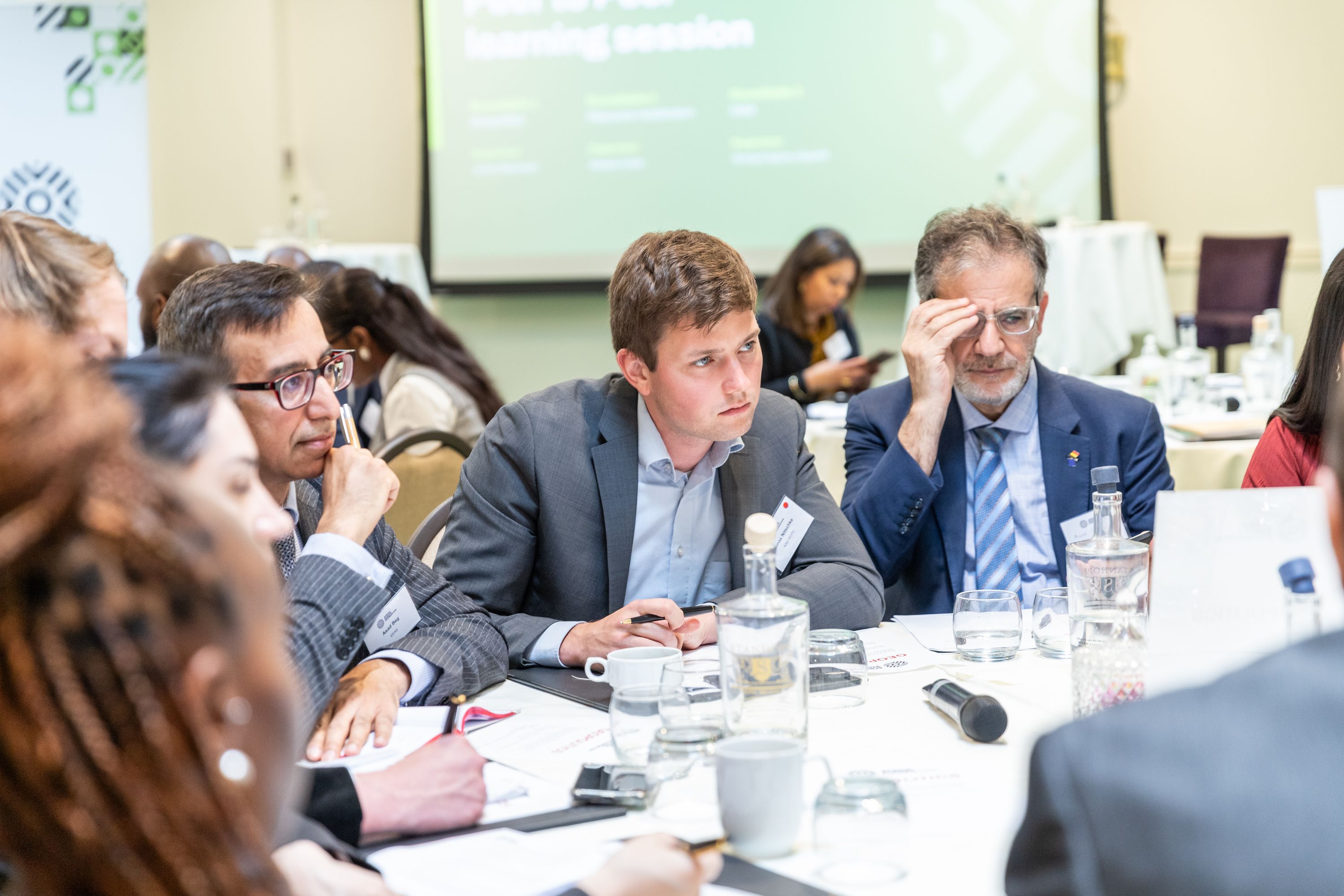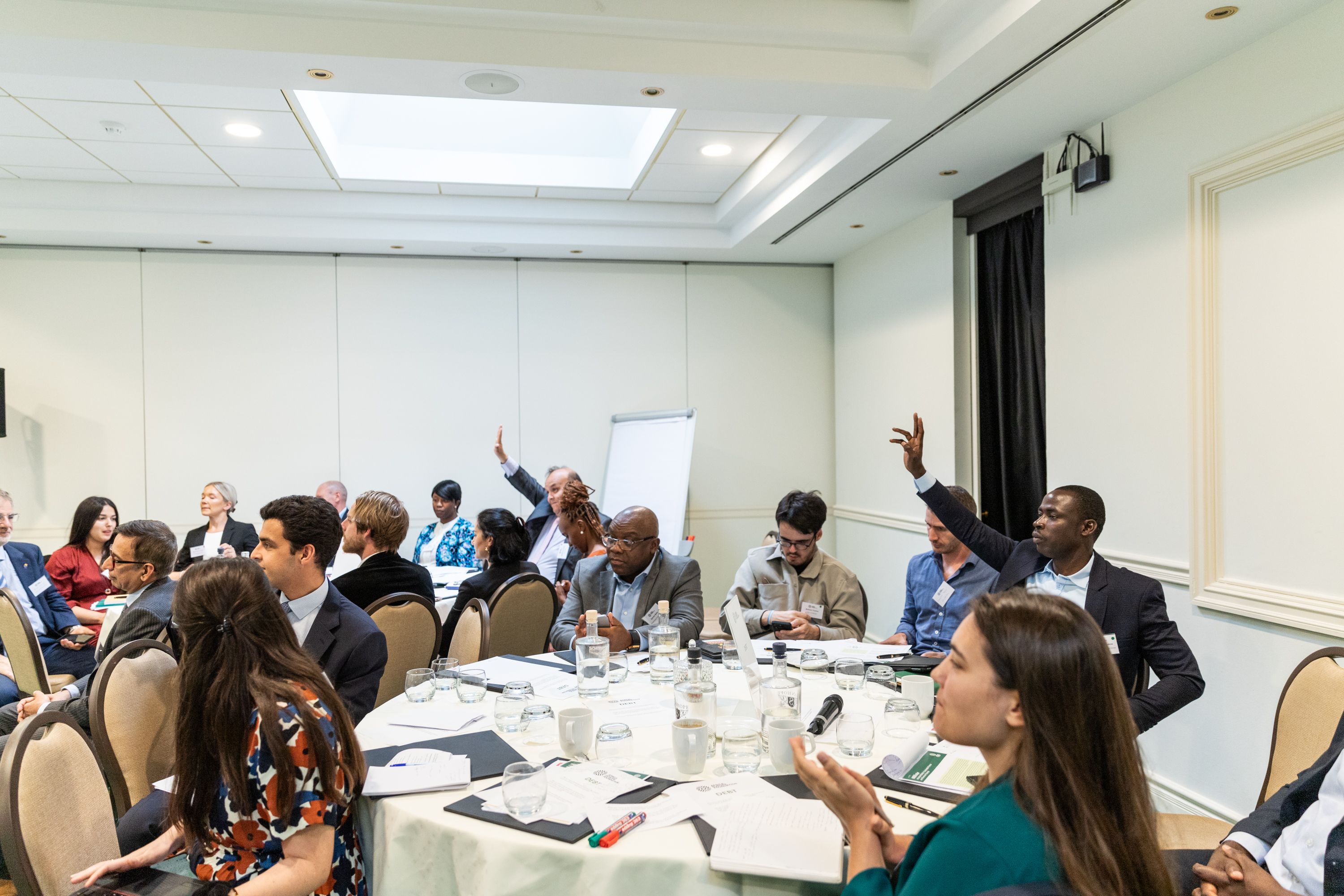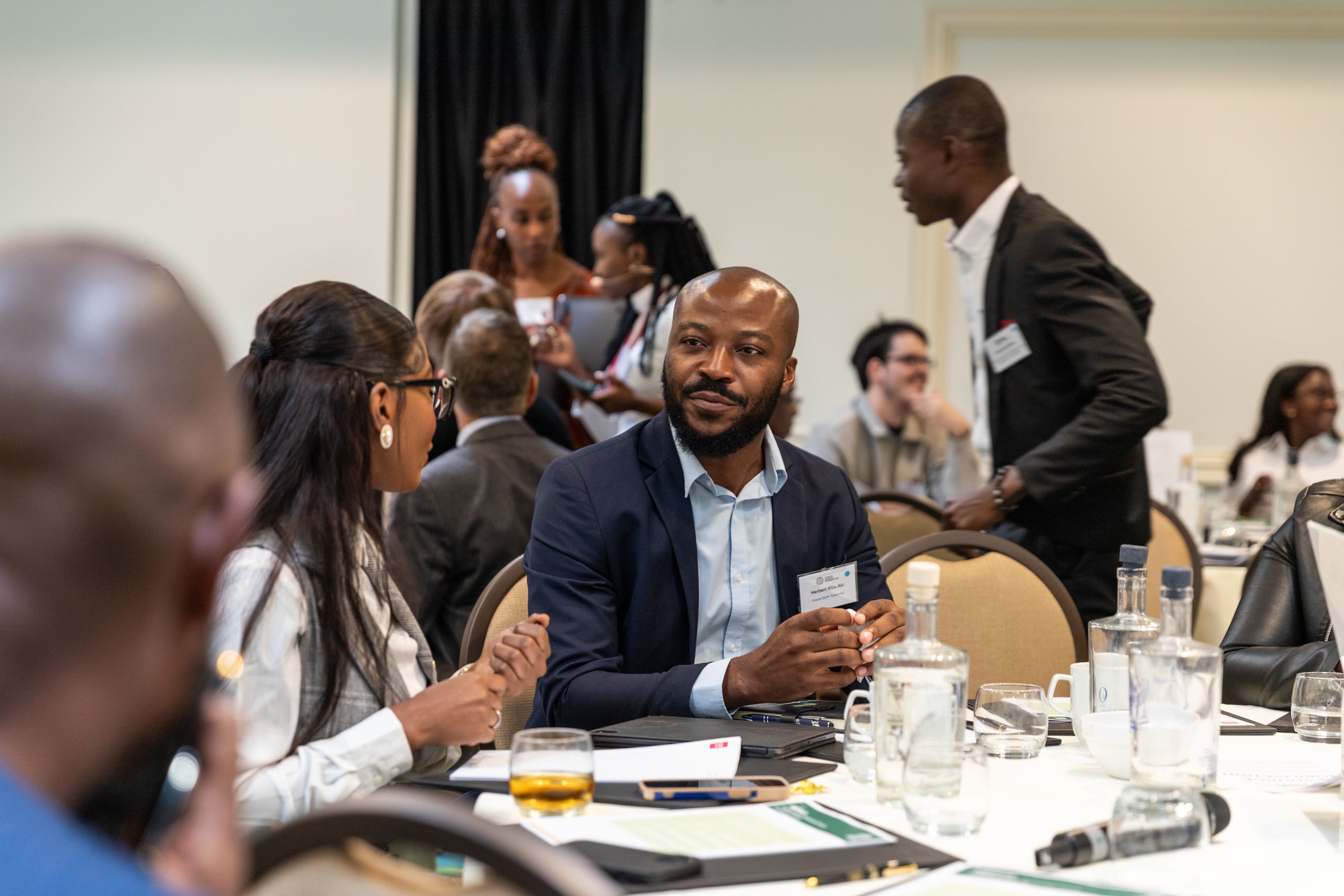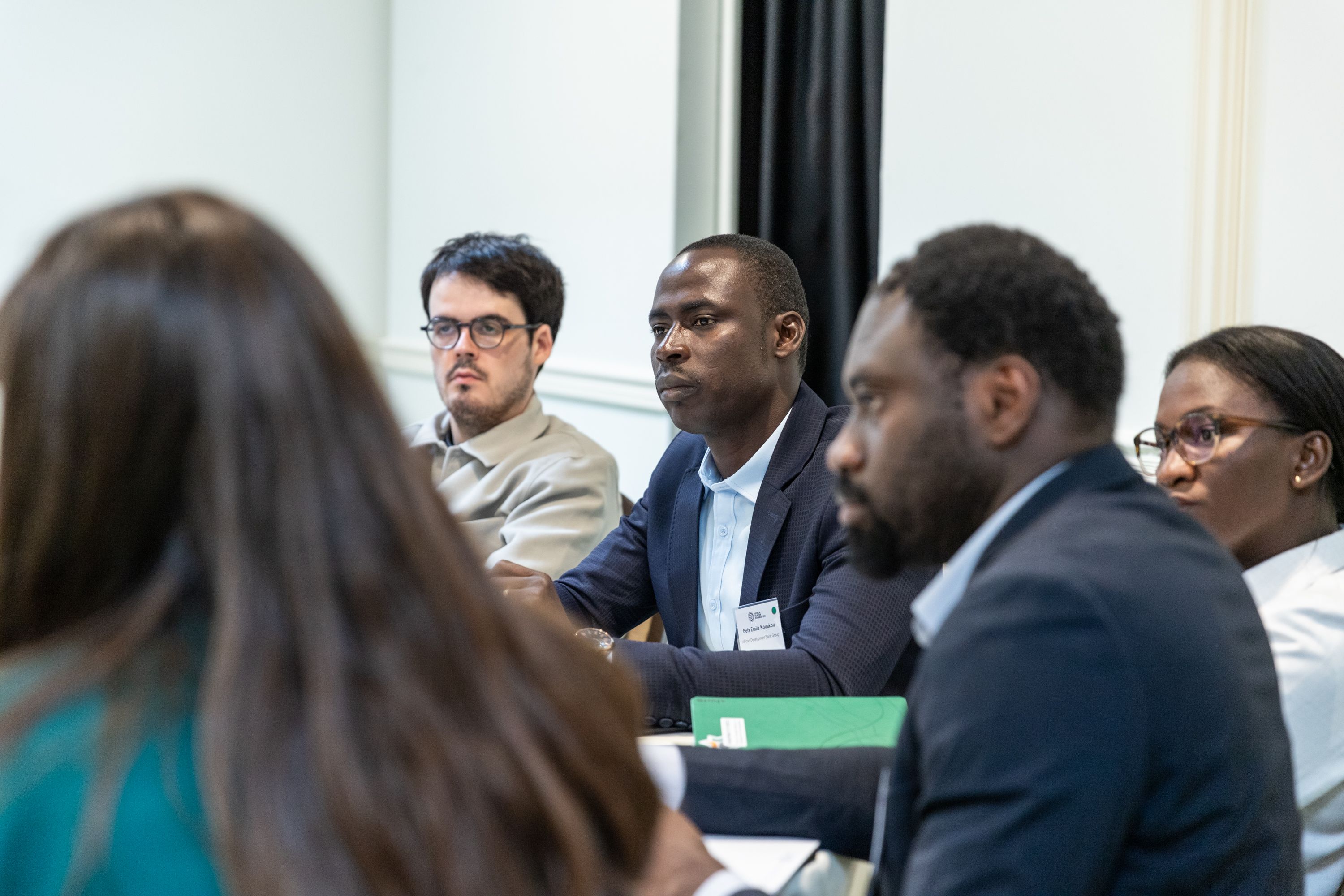- Youth
- Sustainable Finance
Young Leaders Joint Recommendations
- The Africa-Europe Foundation

Youth in Action “Financing the Future” Forum: An Africa-EU Perspective
On the 08 and 09 of July 2024, a cohort of 40 youth and civil society organisation representatives, from Africa and Europe, participated in the Youth in Action “Finance the Future” Forum on Africa-EU perspectives. The event was organised jointly by the European Commission’s Directorate-General for International Partnerships and the Africa-Europe Foundation (AEF). Hosted in Brussels (Belgium), the dialogue sought to strengthen the Africa-EU partnership through constructive interactions on young people’s views and objectives around the topic of sustainable finance.
This declaration brings together the recommendations that the event’s participants delivered on sustainable finance, with specific reference to geopolitics, debt and resource mobilisation.
The first day's schedule included an intergenerational dialogue which aimed to give participants the latest policy and programmatic developments on sustainable finance, from African and EU decision- makers. This session was followed by the cohort being split into breakout groups designed to develop recommendations for further review.
Following consensus on these recommendations, they were presented by appointed youth rapporteurs to African and European decision makers at high level roundtables on sustainable finance as part of the Future Africa-EU strategic dialogues on 09 July.
The young participants outline the following recommendations:






Recommendation 1: Geopolitics
- Changing political winds bring challenges and opportunities
We, the youth representatives, underline that advancing more sustainable finance systems and practices is significantly influenced by political developments on a national and international level. In Europe, the results of past elections such as the European Parliament’s, and upcoming ones such as US elections, together with 17 countries in Africa going to the polls this year and the African Union Commission change of leadership early next, will chart the course for next steps in Africa and Europe’s sustainable finance architecture.
We agree on the fact that so far the main result produced is political uncertainty, which burdens progressing the sustainable finance agenda in meaningful ways. In the EU, the change in leadership could result in changing priorities and limited financial resources for international cooperation between Africa and Europe. Also, there is concern about the rise of populism, mainly from the far-right.
- Multilateral fora offer spaces to build progress
Despite the challenging context, there are a number of opportunities that have the potential to strengthen EU-Africa youth engagement. The upcoming UN Summit of the Future, the G20, as well as the EU-AU Summit, will offer occasions for young people to convey their recommendations to political leaders. Based on the upcoming EU-AU Civil Society and Youth Engagement mechanism, young people will be given a platform for making their voice heard.
- Giving young people the voice they deserve
We recommend appointing two youth champions/ambassadors that present their recommendations to the leaders at every possible opportunity. We recommend to have elected leaders attend youth convenings (and not only the other way round). We recommend that the EU and Africa build mentorship programs as well as better integrating African and European diasporas.
Recommendation 2: Debt
- Converting debt to infrastructure assets
In the context of sustainable finance, addressing debt is crucial. We recognize the significant burden that high-interest debt places on African nations, impeding inclusive growth and sustainable development. We recommend exploring strategies to convert debt into infrastructure assets that favour such inclusive growth and sustainable development, for example by reinvesting interest payments domestically to catalyse productivity though infrastructure and natural resource refinement and by extension domestic resource mobilisation.
- Engaging lenders and aligning their priorities with policy
Engaging lenders, particularly from the private sector, through compelling stories of their potential contributions to these endeavours, is essential. We also recommend exploring the alignment of electoral and financial timelines to ensure coherent debt management and limiting debt for current expenditure. This brings in the notion of responsible lending and borrowing, where there is a need for stronger accountability on how debt is used, to ensure its effective use and value-added. This principle is overarching in application. Climate investment agendas should be interlinked and integrated within tax and finance framework reforms to improve debt sustainability. For example, adaptation finance allocations increase the ability to finance debt because adaptation plays a critical role in economic productivity and resilience. Enhancing and monitoring the responsibility of businesses, while improving the access to sustainable finance at the firm-level is a vital step.
- Promoting Multilateral Development Banks and African Institutions
We recommend emphasizing the role of Multilateral Development Banks (MDBs) and African financial institutions. We welcome the efforts towards the establishment of an Africa Credit Agency. We suggest examining the composition of bilateral debt and improving lender-borrower relations to ensure fair and sustainable agreements.
- Sustainable Restructuring
Conclusively, sovereign restructuring and debt management, guided by a clear vision at both regional and national levels should guide our action today. We believe that this could be achieved by disputing key systemic intervention points as Africans, with the support of the European partners, while putting into place new concrete budgeting processes, supporting renewed stories of inclusive growth and sustainable development.
Recommendation 3: Resource Mobilisation
- Reimagining a more equitable Africa-EU Partnership
With regards Domestic Resource Mobilisation (DRM), we call upon African countries and partners to support the mobilisation of financial resources needed for the continent, in addition to the technical resources and the financial knowledge to effectively leverage such financing. Only such a comprehensive and holistic approach to raise new and additional resources can provide a long-term path to sustainable development finance and efficient management of spending, and help rethink the EU-Africa partnership towards a more equitable and inclusive relationship between both continents.
- Co-creating inclusive African and European Policies
We also recommend for African and European partners to design truly inclusive policies, starting with fostering fair terms for trade for Africa and enhancing the added-value of African exports, in particularly in key strategic sectors such as critical minerals and energy. In the context of the African continental free trade area (AfCFTA) implementation, we call for designing more inclusive trade and investment policies, enhancing capacity-building to African governments’ negotiation capacity, and supporting the human development and skills needed to seize the benefits of economic growth.
- Reforming Multilateral Governance Structures
Similarly, we call for leaders to reform multilateral governance and in particular the global financial architecture to foster African partners’ fair, equitable and non-conditional access to development finance. Additionally, we urge policy-makers to rethink International Financial Institutions governance and open its decision-making bodies to all African countries.
Conclusion
The Youth in Action “Finance the Future” Forum on Africa-EU perspectives held on 08 and 09 July 2024 in Brussels (Belgium) concluded with a set of robust recommendations reflecting the voice of youth and civil society representatives. These recommendations, aimed at enhancing the Africa-EU partnership, emphasised the necessity for greater youth engagement in decision-making processes, building more inclusive policies for African and European stakeholders as well as the need to reform multilateral governance structures to build a more financially sustainable architecture for both continents.
The current legislative cycle, in both Africa and Europe, with many elections on an international level and national level in many key economies for both continents, mean that 2024 is a pivotal year to understand in which direction progress on sustainable finance will flow. At the Future Africa-EU strategic dialogue on sustainable finance on 09 July, decision makers took note of young people’s recommendations and will consider these for future discussions in order to advance sustainable finance with an inclusive approach.
- Download the INTPA Youth4Foresight toolkit by the European Commission.